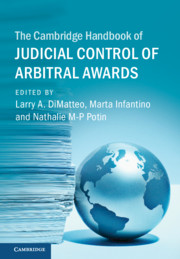Book contents
- The Cambridge Handbook of Judicial Control of Arbitral Awards
- The Cambridge Handbook of Judicial Control of Arbitral Awards
- Copyright page
- Dedication
- Concise Contents
- Contents
- Contributors
- Preface
- Part I Vacating Commercial Arbitration Awards
- Part II Enforcing Commercial Arbitration Awards
- Part III Scope and Interpretation of Arbitration Clauses
- Part IV Judicial Control of Arbitral Awards
- 10 Judicial Control of Arbitral Awards in Argentina
- 11 Judicial Control of Arbitral Awards in Australia
- 12 Judicial Control of Arbitral Awards in Bulgaria
- 13 Judicial Control of Arbitral Awards in Mainland China
- 14 Certain Aspects of Judicial Control of Arbitral Awards in France
- 15 Commercial Arbitration in Germany
- 16 Judicial Control of Arbitral Awards in Italy
- 17 Judicial Control of Arbitral Awards in Nigeria
- 18 Judicial Control of Arbitral Awards in Poland
- 19 Judicial Control of Arbitral Awards in Russia
- 20 Judicial Control of Arbitral Awards in Spain
- 21 Judicial Control of Arbitral Awards in Switzerland
- 22 Judicial Control of Arbitral Awards in Ukraine
- 23 Judicial Control of Arbitral Awards in the United Kingdom
- 24 Judicial Control of Arbitral Awards in the United States
- Part V Summary and Findings
20 - Judicial Control of Arbitral Awards in Spain
from Part IV - Judicial Control of Arbitral Awards
Published online by Cambridge University Press: 08 October 2020
- The Cambridge Handbook of Judicial Control of Arbitral Awards
- The Cambridge Handbook of Judicial Control of Arbitral Awards
- Copyright page
- Dedication
- Concise Contents
- Contents
- Contributors
- Preface
- Part I Vacating Commercial Arbitration Awards
- Part II Enforcing Commercial Arbitration Awards
- Part III Scope and Interpretation of Arbitration Clauses
- Part IV Judicial Control of Arbitral Awards
- 10 Judicial Control of Arbitral Awards in Argentina
- 11 Judicial Control of Arbitral Awards in Australia
- 12 Judicial Control of Arbitral Awards in Bulgaria
- 13 Judicial Control of Arbitral Awards in Mainland China
- 14 Certain Aspects of Judicial Control of Arbitral Awards in France
- 15 Commercial Arbitration in Germany
- 16 Judicial Control of Arbitral Awards in Italy
- 17 Judicial Control of Arbitral Awards in Nigeria
- 18 Judicial Control of Arbitral Awards in Poland
- 19 Judicial Control of Arbitral Awards in Russia
- 20 Judicial Control of Arbitral Awards in Spain
- 21 Judicial Control of Arbitral Awards in Switzerland
- 22 Judicial Control of Arbitral Awards in Ukraine
- 23 Judicial Control of Arbitral Awards in the United Kingdom
- 24 Judicial Control of Arbitral Awards in the United States
- Part V Summary and Findings
Summary
Arbitration enjoys a long tradition in Spain.2 It has been consistently recognized by and promoted throughout historical laws3 as an alternative method for dispute resolution. The recognition of arbitration in legal texts can be traced to Spanish medieval law.4 Breviario de Alarico, or Lex Romana Visigothorum,5 promulgated on February 2, 506, and Liber Iudiciorum,6 among others, acknowledged that the value of arbitration was definitively enshrined in the fundamental Siete Partidas.7 Since then, a series of famous arbitral awards – Compromiso de Caspe 1321 and 1363 (the Covenant of Caspe), Sentencia Arbitral de Guadalupe 1486 (the Arbitral Award of Guadalupe) – and regal laws in Castile fostered the institution by ordering the enforcement of commitments agreed by the parties (Ordenanza de Madrid of 1502). These legal and arbitral decisions paved the way to the incorporation of the institution of arbitration into the Novísima Recopilación (1804).8 The resort to arbitration for solving disputes among merchants and guilds, as a response to their aversion to ordinary courts, gave a lot of impetus to arbitration during that period.
Keywords
- Type
- Chapter
- Information
- The Cambridge Handbook of Judicial Control of Arbitral Awards , pp. 320 - 335Publisher: Cambridge University PressPrint publication year: 2020



